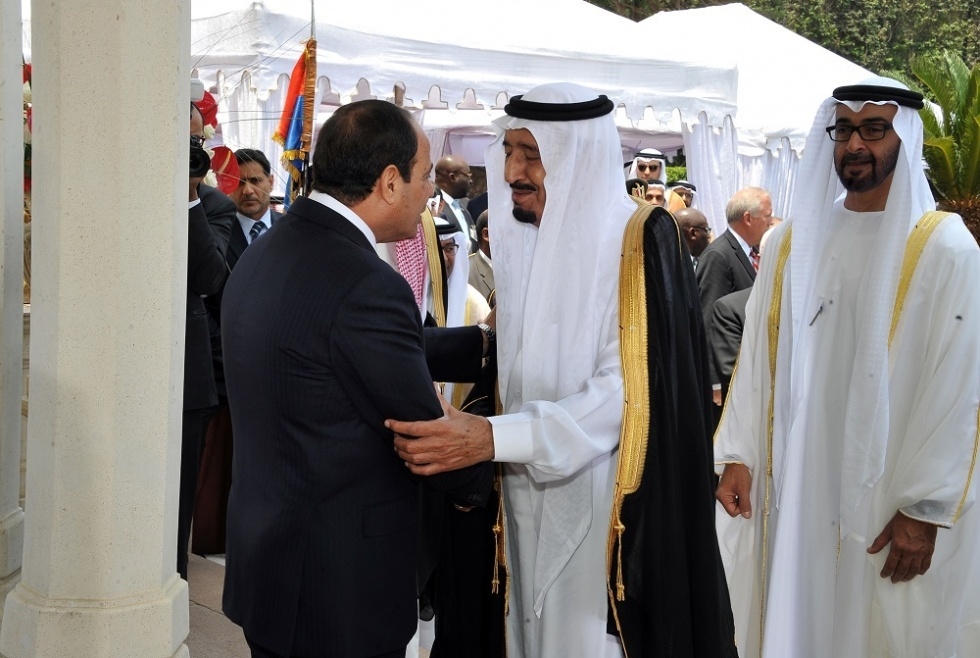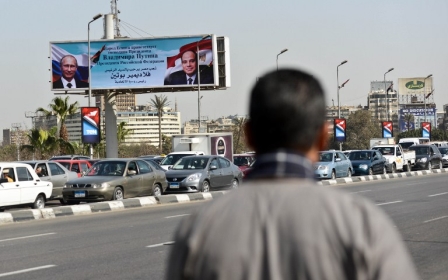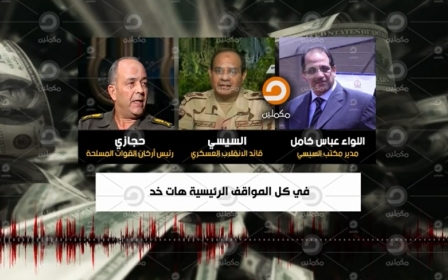ANALYSIS: Will latest leaks rock the Sisi Gulf relationship?

Egyptian President Abdel Fattah al-Sisi found himself in a tough spot on Monday, reportedly having to call his Gulf backers to clear the air after damning leaks appeared to reveal Sisi ridiculing his Gulf backers and saying that he “despised” them, despite their generous financial support.
While it may be difficult to prove that the recordings - allegedly taken in 2013 when Sisi was still defence minister - are real, most analysts agree that recordings are credible enough to be taken seriously and that they could have political ramifications for Sisi if not now, then in the future.
Emad Shahin, professor at the American University in Cairo (AUC) and visiting professor of political science at the School of Foreign Service at Georgetown University, said that the government's silence on the matter was important.
“News sites that side with Sisi have alluded to the possibility that this might be a forgery, but there has been nothing official to prove it,” said Shahin.
“We have seen the sequence before and in previous leaks, no one has come out to officially deny them or try to discredit them.”
John Esposito, founding director at Georgetown University’s centre for Muslim-Christian Understanding agreed:
“So far we have not seen any convincing discrediting of the leaks and you would have thought that would have happened by now.”
The leaks first began appearing late last year, and have been broadcast by a Turkey-based satellite station. Like the latest leak, all were tentatively denied by the press but ignored by the president and his inner circle.
“The reality is that it does not come as a surprise. This has happened before in some of the leaks and it really shows where the people are coming from,” said Esposito.
“The big question is how will the donors feel about this?"
On the surface, the answer is pretty indifferent.
Following Sisi’s placating phone call, Saudi Arabia’s new King Salman stressed that bilateral ties were "stronger than any attempt to disturb them”.
Kuwaiti Emir, Sabah al-Jaber al-Sabah, also assured Sisi that "unity and solidarity with Egypt have not and will not be affected by any attempts to undermine them”.
But beneath the headlines, things may not be quite so rosy.
Problems amass
In contrast to the previous recordings, which only claimed to reveal conversations between Sisi’s close advisors, the latest batch apparently incriminates the former field marshal, turned president, personally.
“The leaks are certainly not going to increase the number of Muslim Brotherhood supporters, but it might well lower the number of Sisi supporters," said Shahin, who has been an open critic of the Sisi administration and who also has been accused of “espionage” alongside former President Mohamed Morsi, a charge he fervently denies.
“This is not going to ... drastically change the landscape, but it will damage the credibility [of Sisi and the current leadership] and raise questions about the level of professionalism of the military establishment.”
The consequences could also be felt further afield, especially as the old leaks focused on internal issues, such as the crackdown on the Muslim Brotherhood, or electoral irregularities, while the latest ones focus on international affairs.
“What these leaks can do is hurt Sisi’s individual popularity and undermine him as an individual,” said Esposito. “So in the future if there was pressure coming from within the military to move Sisi aside, and this combined with pressure from the Gulf donors, then Sisi could find himself quite vulnerable as a result.”
Jane Kinninmont, senior research fellow at Chatham House, also warned that while relations were unlikely to change in the “near term”, the leaks flag “up the likelihood of future friction between the wealthy Gulf countries and the traditional cultural and political heartland of Egypt over where regional leadership should naturally lie.”
Rumors have already begun circulating that more leaks could be on the horizon.
According to former Kuwaiti lawmaker, Nasser al-Duwailah, who website Arabi21.com reported was one of the first to publicly mention the Sisi Gulf leaks, there are at least two more recordings. These apparently will be so shocking that no phone calls from Sisi would calm the Saudis down. "It may require [Sisi] to make a pilgrimage to Mecca," he tweeted.
Duwailah also added that there would be another leak that would require the establishment of a "war crimes tribunal", he said in his tweet.
Since Sisi led a military drive to topple former President Mohamed Morsi in the wake of large-scale protests against Morsi’s rule in 2013, he has relied heavily on the Gulf. Officially the Gulf states, namely Saudi Arabia, Kuwait and the UAE, have poured in $33bn into Egypt since the coup. Unofficially, the figure could be many billions more.
The money has, at least in part, flowed so freely because of the Gulf’s desire to stem the rise of the Muslim Brotherhood, which they feared could threaten the aging, oil-rich monarchs and their governments. Other security concerns such as checking regional rival Iran, preventing the spread of so-called “terrorist” activities, as well as the prevention of further strife in Egypt, have all reportedly played a part.
But while there have been common goals, such as the castration of the Muslim Brotherhood “there were all these other indicators that the Western media did not pick up on”, said Christopher Davidson, a Durham University fellow and author of After the Sheikhs: The coming collapse of the Gulf Monarchies.
“For instance, the relationship with Sisi and [Russian President Vladimir] Putin didn’t really seem to fit with the Sisi and Gulf relationship. There have also been a few other hints here and there that the relationship wasn’t as tight as it might have seemed.”
Sisi has enjoyed warm relations with his Russian counterpart, despite Putin being at odds with the West and the Gulf over Syria.
Sisi not only refused to condemn Putin’s annexation of Crimea last year, he also met with him in August and nearly penned a $3bn arms deal. This week, the pair met again in Cairo to much fanfare and pledged to boost trade and increase terrorism cooperation, even announcing the construction of a nuclear power plant.
Doubts about Sisi have also existed inside Gulf policy-making circles, Davidson explained.
“The massacres of the Brotherhood [seen in Sisi’s Egypt] did not go down well in many circles in Saudi Arabia,” Davidson said. “Elderly Saudis, including members of the ruling family, remember days when the Muslim Brotherhood was actually partially funded by the Saudis as a counterweight to nationalism and [Egyptian President Anwar Sadat] in particular.”
“So this image of the Saudi monarchy being firmly behind Sisi and everything that he has done was very simplistic. History alone tells us that there is much more to this story.”
Suggestive of this have been recent hints that following the shakeup of power in Riyadh, we may be seeing a cooling of relations with Sisi and attempts at reconciliation with the Muslim Brotherhood as well as its Qatari backers.
Nor do many analysts believe the Gulf is economically able to keep up its current rate of funding. With oil prices hitting lows of $45 a barrel in January, down from $115 a barrel in June 2013, even the richer Gulf States have been left reeling.
“The oil price crunch is a big issue and it is putting a strain on Saudi finances. In light of it, the Gulf may start applying different standards,” said Shahin. “The initial stage of suitcases filled with cash will be no more.”
Business as usual
Yet, for now, the alliance seems to be holding. Most analysts agreed that the Gulf was unlikely to heavily curtail its donations, even if we might see more restrictions emerge and the Gulf demand more accountability.
Part of the reason for the enduring unity may be momentum.
The anti-Muslim Brotherhood drive “has gone very far under King Abdullah, with the criminalisation of the Brotherhood, the declaration of it as terrorist organisation and the rounding up of Brotherhood suspects,” said Davidson. “All of this will make a U-turn unlikely.”
Another inhibiting factor could be a cycle of fear propagated by both sides.
“Most of the populace in the Gulf and in Egypt have been subjected to extreme media pounding that equates to brain washing,” said Shahin.
“This idea of fear and insecurity is constant – that without Sisi, or the Gulf leaders, it would be chaos like it is in Iraq, or the situation in Syria or Libya.”
Ultimately, there seems to still be too many people, both internally and externally, with too much invested in this policy, to let it fail now.
“I doubt that there will be a change in policy because America requires this alliance – no matter how fake - to persist,” said Davidson. “Their Middle East strategy hangs on it at the moment.”
Support for Sisi, also has deep roots in Riyahd and Abu Dhabi, explained Esposito.
“My understanding of this - from many sources - is that the initiating of a great deal of this [Sisi support] came from some Gulf governments themselves, and quite aggressively,” he said. “They have also tried to put a lot of pressure on other governments, not only in their region but internationally as well.”
Stay informed with MEE's newsletters
Sign up to get the latest alerts, insights and analysis, starting with Turkey Unpacked
Middle East Eye delivers independent and unrivalled coverage and analysis of the Middle East, North Africa and beyond. To learn more about republishing this content and the associated fees, please fill out this form. More about MEE can be found here.




